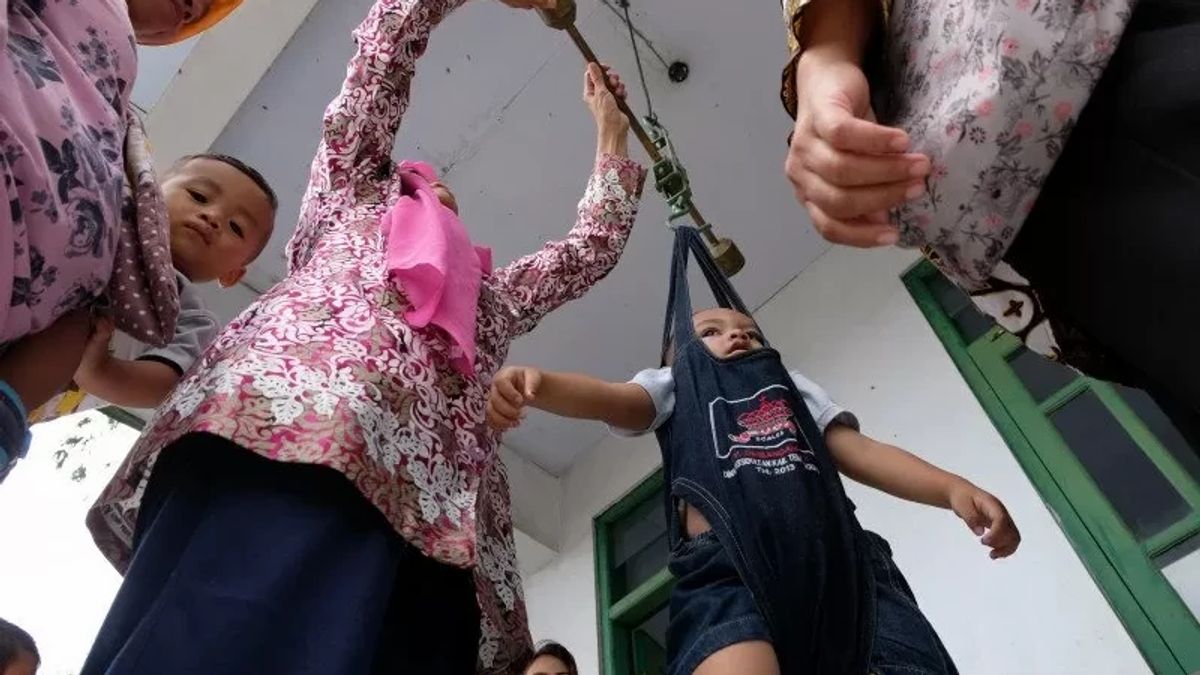JAKARTA - Minister of Health (Menkes) Budi Gunadi Sadikin targets the prevalence of stunting in 2023 to decrease to 17 percent. He encouraged all parties involved in reducing stunting cases in the country to synergize.
If it is stunted, it must be sent to the hospital immediately. There will be management, according to the stages, it must be carried out and measured by anthropometry. Don't let the child be stunted. Once the weight does not rise, it must be intervened," said the Minister of Health in "Socialization of the Intervention Policy for the Acceleration of Stunting Reduction in 2023" which was followed online, Friday, February 3.
The Minister of Health stated that in 2023 the government will focus on pursuing the prevalence of stunting down to 17 percent so that there will be an acceleration of stunting reduction that is on target in 2024.
The government realizes stunting is a complex problem, because it is influenced by sensitive factors, namely things outside the health sector, such as the environment and parenting. Meanwhile, the specific factors are health-related things such as malnutrition and anemia.
Therefore, in accordance with research by the World Health Organization (WHO) which says 70 percent of the causes of stunting can be overcome with sensitive intervention. In completing stunting through specific intervention, the Ministry of Health (Kemenkes) has 11 programs that focus on two phases with the highest determinant of stunting, namely during the period of pregnant women and infants aged 6-24 months.
Minister of Health Budi explained that one of the programs is the provision of education, education, and health promotions for various things related to stunting.
Meanwhile, other programs mentioned include when entering the phase before the baby is born or when the mother is pregnant, his party provides intervention to young women who sit in 7th and 10th classes to be given a Blood Added Table (TTD) to prevent anemia from becoming young.
While distributing TTD, puskesmas is asked to regularly measure hemoglobin (Hb) levels in the blood of young women in the Nutrition Action Program, in order to get concrete data related to adolescents who are anemic.
Then for pregnant women, Minister of Health Budi ensured the intervention provided in the form of providing TTD and providing adequate nutritional intake, especially animal protein.
For measurement efforts on pregnant women, the Ministry of Health changed the policy so that pregnancy examinations through Antental Care (ANC) were carried out six times and twice with ultrasound in order to monitor the fetus to grow normally or not.
Meanwhile, in babies aged 6-24 months, the Minister of Health said the type of intervention provided through the administration of PCV and rotavirus vaccines that can protect babies from repeated infections. For babies under the age of 6 months, it is certain that the exclusive need for breast milk is met.
The biggest infections in babies are pneumonia and diarrhea, so immunization is important for babies. For identified babies at risk of stunting, we must prevent it from animal protein. It can be from eggs, chickens, fish, meat, milk, and immediately intervened to be measured with scales," he said.
The English, Chinese, Japanese, Arabic, and French versions are automatically generated by the AI. So there may still be inaccuracies in translating, please always see Indonesian as our main language. (system supported by DigitalSiber.id)











